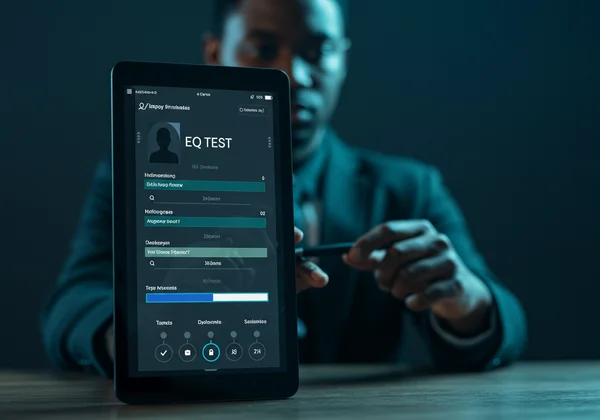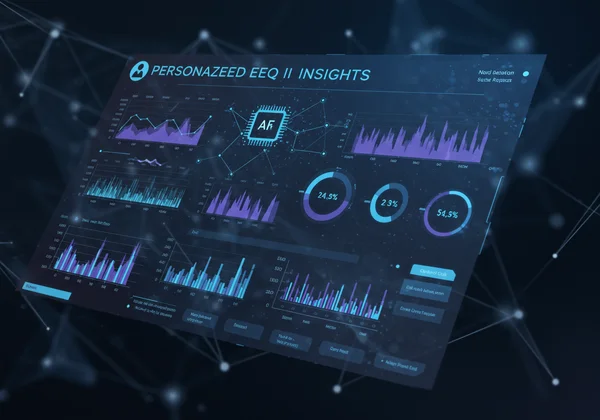EQ Test for Leaders: Boost Emotional Intelligence in Management
September 29, 2025 | By Isla Caldwell
What truly sets exceptional leaders apart? It's not just their technical prowess or IQ, but their capacity to deeply understand and influence their teams through emotional intelligence (EQ). This is where emotional intelligence (EQ) becomes your most powerful, yet often untapped, advantage. If you've ever wondered how to elevate your management style from good to truly exceptional, the answer might be found by taking a professional EQ test. But how can I test my EQ for free? This guide will not only answer that question but also show you how leveraging insights from an emotional intelligence assessment can fundamentally transform your leadership.

Understanding Emotional Intelligence in Leadership
Emotional intelligence is the cornerstone of effective management, yet it's a concept many leaders are still exploring. It's the ability to perceive, use, understand, manage, and handle emotions in positive ways to relieve stress, communicate effectively, empathize with others, overcome challenges, and defuse conflict. For managers, this isn't just a "soft skill"—it's a critical competency that drives tangible results. A deep understanding begins with an accurate assessment, and you can begin your test today to get a clear baseline.
What Exactly is EQ and Its Core Components for Leaders?
For leaders, EQ isn't an abstract theory; it's a practical toolkit. It can be broken down into five core components that directly impact your daily interactions and strategic decisions. These include self-awareness, or knowing your own emotions and how they affect your thoughts and behavior. Then there's self-regulation, the ability to control impulsive feelings and behaviors. Motivation drives you to achieve goals, while empathy allows you to understand the emotions and needs of others. Finally, social skills are essential for managing relationships and building networks. Mastering these elements is the foundation of high-EQ leadership.
Why Emotional Intelligence is a Modern Leader's Most Valuable Asset
In a competitive landscape where employee engagement and retention are paramount, emotional intelligence is no longer optional. It is the very asset that allows a leader to build psychological safety, foster a culture of trust, and inspire loyalty. A leader with high EQ can read the room, adapt their communication style, and provide support that is genuinely felt by their team. This ability to connect on a human level is what separates managers who merely give orders from leaders who cultivate dedicated, high-performing teams. Your journey to becoming that leader can start with a simple step: a comprehensive EQ assessment.
The Impact of High EQ on Management Effectiveness
The difference between a low-EQ and a high EQ management style is night and day. Leaders with high emotional intelligence don't just manage tasks; they nurture talent and build resilient teams. Their influence creates a positive ripple effect throughout the organization, improving morale, productivity, and the bottom line. The benefits are not theoretical—they are visible in the day-to-day effectiveness of the team and the overall health of the workplace culture.
Building Motivated & Engaged Teams Through Empathy
Team motivation is a direct outcome of empathetic leadership. When employees feel understood and valued, their commitment skyrockets. An emotionally intelligent leader actively listens, acknowledges concerns, and celebrates successes. They understand that each team member has unique motivations and challenges. By demonstrating genuine empathy, you create an environment where people feel safe to contribute their best work, knowing their leader has their back. This fosters a sense of belonging and shared purpose that is more powerful than any financial incentive.

Strategic Decision-Making and Problem Solving Under Pressure
Leadership is often defined by the decisions made during times of stress. This is where emotional intelligence shines. High-EQ leaders possess the self-regulation to remain calm and objective when the pressure is on. They can analyze a situation without being clouded by panic or frustration, leading to more strategic decision-making. They assess not just the data, but also the human impact of their choices, ensuring that solutions are both effective and sustainable for the team.
Navigating Change, Conflict, and Challenging Conversations
Change is inevitable, and conflict is a natural part of any workplace. An emotionally intelligent leader is equipped to handle both with grace and skill. They can anticipate team anxieties during a transition and communicate with clarity and compassion. In moments of conflict, they act as mediators, not judges, seeking to understand all perspectives and find a constructive path forward. This adeptness at conflict resolution prevents minor disagreements from escalating and strengthens team cohesion in the long run.
Using an EQ Test to Enhance Leadership Potential
Understanding the importance of EQ is the first step; measuring it is the second. A scientifically designed EQ test for leaders provides an objective snapshot of your current emotional intelligence. It moves you from abstract concepts to concrete data, giving you a clear starting point for targeted development. Rather than guessing your strengths and weaknesses, an assessment gives you the clarity needed to build a real plan for growth.
What an EQ Assessment Reveals About Your Leadership Style
An emotional intelligence test does more than give you a number. It provides a detailed breakdown of the five core components of your EQ. It can reveal if your leadership style is more directive or collaborative, whether you naturally lean into empathy, or if you maintain composure under pressure. These insights help you understand the "why" behind your actions and how your emotional responses are perceived by your team. You can discover your EQ score and begin this process of self-discovery right now.
Interpreting Your EQ Score for Managerial Insight
Receiving your eq score for managers is a pivotal moment. A lower score in a certain area isn't a failure; it's an opportunity. For instance, a low score in self-awareness might explain why you sometimes receive unexpected feedback from your team. A score indicating a need for growth in empathy could be the key to unlocking better team collaboration. The score is a diagnostic tool, providing you with the specific insights needed to focus your professional development efforts where they will have the most impact.
Actionable Roadmaps from Personalized AI-Driven EQ Reports
This is where our platform truly stands out. Beyond a simple score, our platform offers an optional, in-depth AI-driven report. This isn't a generic summary; it's a personalized roadmap for your leadership journey. The AI analyzes your unique response patterns to provide highly specific, actionable insights into your strengths, challenges, and blind spots. It offers tailored strategies and exercises to help you develop the exact EQ competencies you need to excel. This level of personalization turns your test results into a powerful tool for transformation. Get your AI report to see the difference.

Practical Strategies to Cultivate Your Leadership EQ
Emotional intelligence is not a fixed trait. Like any skill, it can be developed and strengthened with conscious effort and consistent practice. Once you have your baseline from an online eq test, you can begin the rewarding work of cultivating your leadership EQ. The key is to focus on small, consistent actions that build better habits over time.
Boosting Self-Awareness: The Foundation of Leadership EQ
The journey to higher EQ begins with self-awareness. Start by practicing mindfulness or simply taking a few moments each day to check in with your emotions. Keep a journal to track your feelings and identify what triggers certain reactions. Ask trusted colleagues for honest feedback on your communication and leadership style. The more you understand your own internal landscape, the better you can manage it and understand others.
Developing Empathy and Social Skills for Team Cohesion
To improve your empathy and social skills, practice active listening. In conversations, focus completely on what the other person is saying, both verbally and non-verbally, without planning your response. Make an effort to see situations from your team members' perspectives. Acknowledge their feelings and validate their experiences, even if you don't agree. Small gestures of recognition and appreciation go a long way in building strong relational bonds.
Mastering Self-Regulation in High-Pressure Environments
Mastering self-regulation is crucial for maintaining leadership presence. When you feel a strong emotion like anger or stress rising, learn to pause before you react. Take a deep breath, step away from the situation for a moment if you can, and choose a considered response instead of an impulsive one. This practice prevents you from making decisions you might later regret and models emotional maturity for your entire team.

Your Path to Empathetic and Effective Leadership
In the modern workplace, effective leadership is synonymous with high emotional intelligence. It is the driving force behind engaged teams, strategic thinking, and a resilient organizational culture. By understanding and actively developing your EQ, you are not just improving a soft skill; you are investing in the very core of your leadership potential.
The journey starts with a single, powerful step: understanding where you stand today. Don't leave your most critical leadership asset to guesswork. Take our scientifically validated, free EQ test to gain invaluable insight into your emotional intelligence. It’s the first step toward becoming the influential, empathetic, and effective leader your team deserves. Start your EQ assessment now and unlock your true potential.
Frequently Asked Questions About Leadership EQ and Testing
What is a normal EQ score for a manager?
There isn't a universal "normal" score, as results can vary based on the specific test and industry benchmarks. However, successful managers typically score higher in areas like self-regulation, empathy, and social skills. The most important thing isn't the raw number, but understanding what your specific score reveals about your strengths and areas for growth. An accurate eq test will provide this detailed breakdown.
How do highly emotionally intelligent leaders behave?
Leaders with high EQ are excellent communicators and listeners. They remain calm under pressure, are approachable, and show genuine empathy for their team members. They are self-aware, open to feedback, and skilled at resolving conflicts constructively. Ultimately, they create an environment of trust and psychological safety where people feel motivated to do their best work.
Can a person have high IQ but low EQ and still be a good leader?
While a high IQ is valuable for technical and strategic tasks, it is rarely enough to make someone a good leader on its own. A leader with high IQ but low EQ may struggle with team morale, communication, and conflict resolution, which can ultimately undermine their effectiveness. The most successful leaders blend intellectual strength with emotional intelligence.
How can I start improving my emotional intelligence as a leader?
The best way to start is by getting a clear baseline. Taking a free emotional intelligence test will give you a detailed picture of where to focus your efforts. After that, you can begin with small, practical steps: practice active listening in every meeting, start a journal to build self-awareness, and consciously pause before reacting in stressful situations. Consistent practice is the key to lasting improvement.